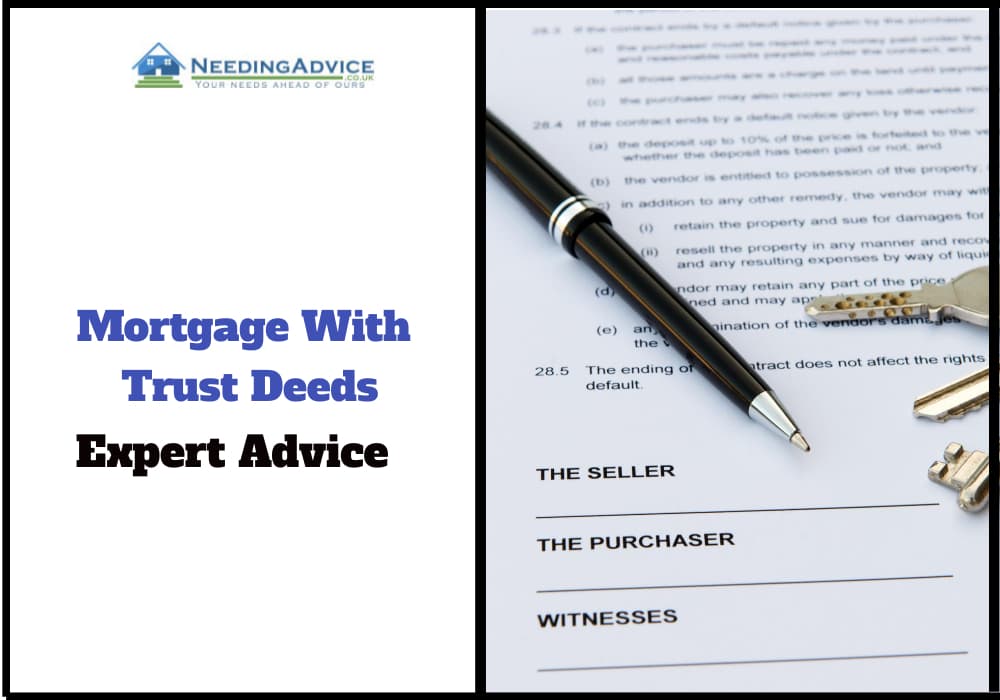Trust Deed Mortgage
Getting a mortgage with a deed of trust is becoming popular in the UK. As a specialist mortgage broker, we receive various enquiries for trust deed mortgage applications. So, with this guide on getting a mortgage with the deed of trust, we will help you to understand the complete mortgage process.
There are various reasons for arranging a joint mortgage with a friend or family member. By spreading the costs and responsibilities in this way, you might find it easier to get that first foot on the housing ladder. Or, you might be looking for shared ownership of your home to cement a close relationship.
Sometimes those shares in the ownership of the property can differ. And if ownership is shared unequally, a mortgage with a Deed of Trust – or a Declaration of Trust mortgage – may be required.
What is a Deed of Trust in England and Wales?
While many sharing arrangements for sharing the responsibilities of a mortgage are based on each party enjoying equal shares, there are occasions when you might decide that different, unequal shares are appropriate. If each party has contributed a bigger deposit or is taking on a more significant percentage of the mortgage repayments, for example, they are almost certain to reasonably demand a bigger share of any profits if and when the property is sold.
When ownership is shared unequally like this, a mortgage with a Deed of Trust may be required.
A Deed of Trust is a legal document drafted to record how shares in property ownership are divided. Although, typically, a property may be owned by “tenants in common” – unlike “joint tenants” – tenants in common can pass on to beneficiaries in a will their specified share in the property.
Unless a legal document sets out the alternatives, if the ownership of a property is shared, it is assumed that each party has an equal share. In that case, they are “joint tenants”, and when one dies, his or her shares pass automatically to the remaining owner – the ownership percentage cannot be bequeathed by way of a will, for example.
A Deed of Trust removes any room for doubt. It sets out in clear legal terms the share owned by each party named in the title deedsLegal documents that prove ownership of a property. of the property, identifies how much each of them has contributed to its purchase, and describes what will happen in the future to their respective investments in the property.
The future might be shaped by:
- the sale of the property;
- a breakdown in the relationship between the co-owners;
- one owner buying out the share of the other owner;
- one of the owners gets married or has children; or
- a party who may have contributed to the purchase of the property – a loan from the bank of Mum and Dad, for instance – wants repayment.
Your Deed of Trust or Declaration of Trust will set out exactly what happens in these – or any other – circumstances resulting in a change of ownership.
Does a Declaration of Trust affect a mortgage?
In many cases, the existence of a Deed of Trust may not affect a mortgage at all. In other cases, however, such a Deed or Declaration might be required by the mortgage lender – and the lender’s consent to the terms of the Deed will be necessary before the legal document can be filed.
The mortgage lender’s interest in the document relates to any implications for the property subject to a Declaration of Trust that is offered in security for the mortgage advance. For that reason, you may need to instruct a solicitor to examine the Declaration of Trust, confirm that the arrangements do not impact the security of the property, and seek the necessary approval and consent of your chosen mortgage lender.
As with any mortgage advance, your lender will want reassurance that the mortgage debt will be repaid – through regular monthly repayments or the settlement of any outstanding mortgage balance on the sale, transfer, or repossession of your home. In addition, the lender will need to be reassured that the arrangements detailed in any Declaration of Trust do not prejudice those rights to recover the outstanding mortgage advance.
A case in point, for example, might be the Declaration that grants an individual a legal right to inhabit the property even without their being named in the mortgage deeds. In those circumstances, the lender could find itself stymied in any subsequent attempt to repossess the property – since the action could be blocked by the individual who had been granted the legal right to live there.
This is just one example illustrating the potential implications of your shared ownershipA scheme where a borrower purchases a share of a property an... and any mortgage with Deed of Trust. It highlights the need to secure early legal advice before any mortgage application.
Do you need a Deed of Trust?
To sum up, therefore, you might want to seek further advice about a Deed of Trust or a Declaration of Trust mortgage if:
- you are thinking of buying a home with shares divided as “tenants in common”;
- the costs of the purchase – and proceeds from any subsequent sale – will not be shared equally (whether you are buying as “tenants in common” or as “joint tenants”);
- another individual or individuals are providing financial help for the purchase of the property;
- your legal ownership of the property has not been registered with the Land Registry; or
- you have children from an earlier relationship and want to ensure their inheritance rights are safeguarded by your shared property ownership as a “tenant in common”.
Next Steps – Trust Deed Mortgage
Although you will need to instruct a solicitor to draft a Deed of Trust or Declaration of Trust, you might first want to talk to us here at NeedingAdvice.co.uk. We can help determine whether such a document is likely to be necessary and whether any mortgage lenders, in particular, are likely to insist upon such a document.
FAQs – Mortgage with Trust Deeds
What is a mortgage deed of trust?
A mortgage deed of trust is a voluntary agreement between you and your creditors. You agree to pay them back over time, but they also agree to give you some protection against losing your home. A mortgage deed of trust is usually used when you borrow money to buy a house. This means that the bank or building society lending you the money agrees to protect it by giving you a piece of paper called a mortgage deed of trust. This gives the bank or building society the right to take possession of your home if you fail to make payments. The mortgage deed of trust is like a contract between you and the bank or building society. If you don’t keep up with your repayments then the bank or building society can use its power under the mortgage deed of trust to repossess your home.
How does a mortgage deed of trust work?
Trust deeds mostly last for four years, during which time you can make affordable repayments to your lender. After this period, however, you may have to start paying interest on top of the original loan amount. This is because the lender wants to recover all the money lent plus interest. When the four-year term expires, the lender can either sell the property or let you stay in it rent-free until you pay off the remaining balance. It is important to note here if your trust deed is removed from your credit file, lenders still may not lend to you again. If you have a mortgage trust deed in your credit report, it is always better to contact a mortgage provider who can help you with your application.
How do trust deeds affect my ability to get loans?
Having a trust deed in your credit ratings affects your ability to get loans. Mortgage lenders may consider your trust deed as a risk factor and decide not to offer you a loan. However, if you have a good track record of making regular payments, your trust deed should not stop you from getting a loan. Your trust deed will remain on your credit rating for seven years after the end of the initial term. In case you have a trust deed on your credit report, there are chances that it has impacted your credit score. Having a poor credit score may affect your chances of any mortgage approval, so it is better to coordinate with a trusted mortgage advisor before applying for a mortgage.
Can I Get a Mortgage With a Trust Deed?
Yes, you can get a mortgage with a trust deed but may need to understand a few things. A trust deed is a legal instrument used to set out how assets are held and managed when more than one person owns them. This includes real estate. When you buy a house together, it is called joint tenancy. If you own a house together, you each hold equal title to the property. You both own half of the property and neither can sell his/her share unless the other agrees. However, when you buy a house together using a trust deed, you don’t own half of the property. Instead, you own a percentage of the property based on the amount of money you put down. There are many other things that you need to know before starting your application with a mortgage lender. Feel free to contact our team for any trust deed advice.
What does a Trust Deed involve?
A Trust Deed involves paying off part of your debts over the course of at least 4 years. You’ll need to tell an Insolvency Practitioner about your income and assets. He/she will then use this information to create a plan of repayment on your behalf.
Will a Trust Deed affect my chances of getting a mortgage?
Yes, trust deads will affect your chances of getting a mortgage because it means you won’t be able to pay back all of your debt at once. The good news is that you can still apply for a mortgage even if you’ve got a trust deed. Your lender needs to see proof that you’re able to make payments on time. They also need to see that you have enough money to cover the loan repayments. Once they’ve seen this, they should be happy to give you a mortgage.






